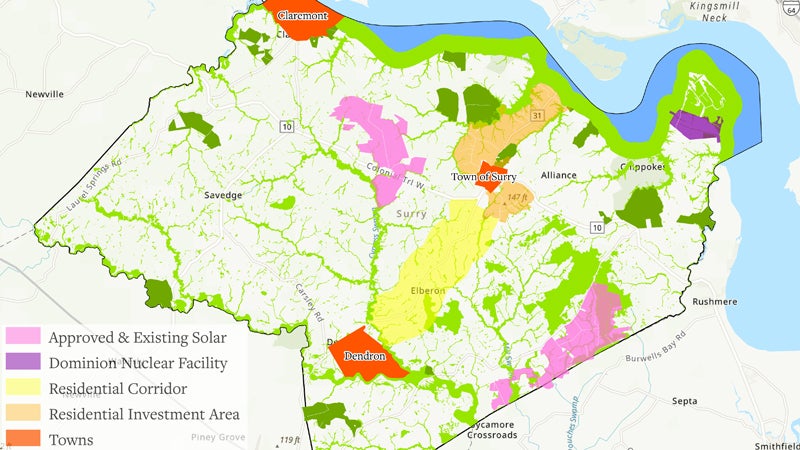Surry ‘energy policy’ set for Nov. 21 hearing
Published 4:16 pm Friday, October 28, 2022

- The energy policy includes this map showing where Surry's solar and nuclear power facilities are located. In light and dark green are conservation areas and wetlands. Not pictured is the Align RNG "biogas" facility approved earlier this year. (Image courtesy of Surry County)
Surry County’s Planning Commission will hold a Nov. 21 public hearing on a proposed “energy policy” amendment to its 2040 Comprehensive Plan.
The hearing is to take place during the Planning Commission’s scheduled meeting, which begins at 7 p.m. in the county government complex at 45 School St.
While aimed primarily at limiting the number and location of new solar farms, the policy is intended to be inclusive of all energy sources, including Dominion Energy’s existing nuclear plant.
The amendment would limit utility-scale energy project sites to 10% of the county’s land, subtracting water and wetlands, for a maximum of 15,278 acres. Of this, 9,263 acres are already taken up by existing and approved utility-scale solar farms and the nuclear plant. Another 22.8 -acre parcel at the Surry-Sussex county line is slated for Align RNG’s “biogas” processing facility, leaving just under 6,000 acres available for any future energy projects.
The amendment defines “utility-scale” as any energy storage facility with a rated capacity greater than or equal to 20 megawatts, used to generate electricity beyond the area in which the facility is located. “Shared solar” or “community-scale” energy facilities generating 1 to 19 megawatts and requiring no connection to high-voltage power lines would not be subject to the 10% cap. Nor would “distributed energy” facilities, the term referring to solar panels on residences, businesses and schools generating less than 1 megawatt.
The term “project site” is defined as the “entirety of the parcels on which an energy facility will be installed” rather than just the fenced area where solar panels or other infrastructure would be located.
Surry last revised its Comprehensive Plan in 2020. The 142-page document, intended to guide land use devisions, currently makes no distinction between utility-scale and non-utility-scale solar setups.
The plan adopted in 2020 currently states solar farms are to “avoid or minimize” impact to farmland, be screened and located outside of residential investment areas, not visually impact scenic or cultural resources, and be sited “as close to existing electric transmission lines as possible.”
The proposed energy policy would clarify the “as close as possible” provision to a maximum of one mile from the center of the facility site to the nearest high-voltage transmission line. It would further clarify the visual impact provisions to specify a distance of half a mile between any part of the facility and a historic site, and a distance of at least 750 feet between the facility and the property line for any place of worship or cemetery.
Currently, when new solar farms have been proposed in Surry, their developers have requested a slate of approvals, including conditional use permits and a vote declaring the project “substantially in accord” with the Comprehensive Plan. The energy policy proposes changing that process to a “mandatory pre-application meeting” to determine the project’s conformity with the plan ahead of any vote on the other slate of requested approvals.
“Substantially in accord” does not mean 100% in compliance with every provision of the Comprehensive Plan, explained Horace Wade, Surry County’s director of planning and community development. As such, Commissioner Diane Cheek called for adding the provision barring energy projects from siting less than half a mile from a historic site to the solar ordinance the Board of Supervisors adopted in 2018.
The energy policy further states that facilities are to use “best practices to maintain biodiversity and soil quality,” meet or exceed Virginia stormwater requirements and incorporate “contiguous, unfenced, undisturbed natural areas to serve as wildlife passage corridors.”
An earlier draft of the energy policy had included a provision barring the use of pesticides or herbicides when maintaining a project site’s landscaping buffer. The current less-restrictive draft states herbicides are allowed but “should be overseen by certified professionals to limit air, water, and soil pollution.”
Any noise-generating equipment is to be “installed with sound dampening equipment and/or located a minimum of 750 feet away from any adjacent residential, commercial, or mixed-use parcels.”
At its Oct. 24 meeting, the Planning Commission asked that another provision be added to restrict new energy projects from siting within half a mile of an existing or approved project.





